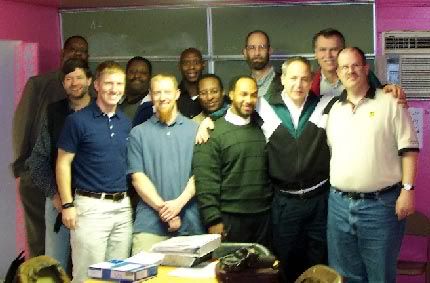In the words of Semisonic...

Free intercourse and mutual confidence between the churches is very desirable, and every one should labor to promote it; but purity of doctrine and practice should never be sacrificed to effect it. - J.L. Dagg

Dear Sean,
As you know (because you are me) attending the EFCA National Leadership Conference was a good opportunity for me to think about a whole myriad of issues relating to the proposed rewrite of the Statement of Faith. While the only “formal” discussion I went to was the first session in which the SHC essentially rehashed what was heard at the district conference it still helped me process a number of things I’ve been thinking about for some time now.
First, it deepened my respect and appreciation for the members of the committee I’ve heard from (Bill Kynes and Greg Strand to be specific). Time and again they have explained the process they’ve gone through to this point and stated the reasons for the process. They have graciously admitted that the process has not been flawless, but have recognized that they’re onto something that can’t be abandoned simply because there has been a mistake or two along the way.
Now Sean, I know you’ve been reading my posts on this site since December so maybe that last statement of mine came as a bit of a shock; take a minute, slurp down some more coffee, and allow it to sink in a bit… Finished? Good. Allow me to go into greater detail regarding “they’re onto something that can’t be abandoned.” Our Statement of Faith needs to be revised. If the denomination fails to recognize the need for revision then we can either expect to become the Fundamentalist Free Church of America – we sit back and say “everything I ever needed to know about God and life in general was summarized in the 1950’s,” or we become the Liberal Free Church of America – and we declare “yeah, we have this statement from the 1950’s that we cherish as a historical marker, but we’ve decided to reinterpret it to mean what we think it should mean for today.” We must have a process for revision and that is precisely why the resolution we voted for at the conference was so important.
So yes, I’m in favor of revision. Does this mean I’m ecstatic about the proposed rewrite? Yes and no. I’m excited that we are having these conversations (and writing these letters to each other); that we’re discussing what it means to be a denomination/movement that is quintessentially evangelical and unashamed. I’m happy to see us thinking about the context in which we minister today (when heresies like open theism exist and the challenges of post modernism force us to examine our epistemology). I’m not excited about all of the proposed changes, but I am happy to know that the Spiritual Heritage Committee is listening to guys like us.
There’s one more thing that was on my mind at the N.L.C.: Classical dispensationalists. I’m not sure how many classical dispensationalists were around or how many there are in the EFCA in general, but I do know that they’re worried sick. In a way, I feel sorry for them. Many of them feel that the denomination they have been a part of for years is abandoning an essential component of what they hold dear theologically. There are a few things I would like to say directly to them like, “Don’t worry there are many other churches and denominations that don’t speak specifically about the tribulation or the millennium but still hold to Dispensationalism (like many Southern Baptist churches),” but this letter is written to you, a historic premillennialist, not to them. So here’s what I have to say to you: be kind and understand that Dispensationalism is an entire system for understanding the Bible. You wouldn’t like it if people in your church or denomination seemed to be moving away from the way that you understand the Bible (especially if it was the way that many of the key founders of the denomination understood the Bible). So do what the members of the Spiritual Heritage Committee have modeled so well – patiently listen to all and pray that God will be glorified in and through this process.
For the glory of Christ in His Church,
The Freechurchman
Next Friday I'll be en route to the Great Lake State and from there it's the arduous drive to the EFCA National Leadership Conference (and I don't think Fuller will be coming along - but who's to say?), so this might be it for a few Fridays:
Several of our religious denominations have arisen from a conscientious desire to restore Christianity to its primitive purity. From this motive acted, I believe, the greater part of the Reformers, the puritans, the nonconformists, and the Baptists. I do not know that any one of these denominations were censurable for the separations which they made from other professing Christians. It may be alleged that they have torn the church of Christ into parties, and so occasioned much evil; yet some of them did not separate from the church of Christ, but from a worldly community calling itself by that name; and those who did, pretended not to be the only people of God in the world, but considered themselves merely as “withdrawing from brethren who walked disorderly.” It is a melancholy fact, however, that no sooner have a people formed themselves into a new denomination than they are in the utmost danger of concentrating almost all their strength, influence, zeal, prayers, and endeavours for its support; not as a part of Christ’s visible kingdom, but as though it were the whole of it, and as though all true religion were circumscribed within its hallowed pale. This is the essence of a sectarian spirit, and the bane of Christianity.
- from "The Necessity of Seeking Those Things First Which are of the First Importance," The Complete Works of Andrew Fuller, vol. iii, 796.

My very first post in December was a call to remember what Carson and Woodbridge refered to as the "twin dangers" when discerning biblical truth. Now that the National Leadership Conference regular registration period has ended and many have no doubt signed up to attend the conference's sessions on the Statement of Faith revision, it seems like an appropriate time to post what John Frame has called an "Unrealistic Dream" in his article "Machen's Warrior Children" (for more writings by Frame and by Vern Poythress and to support their ministry click here). I realize that there are many in our churches and denomination who do not consider themselves Reformed; please understand that Machen's audience is the PCA and other conservative presybterian churches. Nevertheless there is much that can be gleaned from Frame's dream -
1. That Reformed thinkers continue to have bright, fresh ideas, but that they present these ideas with humility and treat with grace and patience those who are not immediately convinced.
2. That Reformed thinkers with bright ideas discourage the rapid formation of parties to contend for those ideas.
3. That those initially opposed to those bright ideas allow some time for gentle, thoughtful discussion before declaring the bright ideas to be heresy.
4. That these opponents also discourage the rapid formation of partisan groups.
5. That those contending for various doctrinal positions accept the burden of proof, willing to bear the difficulty of serious biblical exegesis.
6. That we try much harder to guard our tongues (Jas. 3:1-12), saving the strongest language of condemnation (e.g., “denying the gospel”) for those who have been declared heretics by the judicial processes of the church.
7. That Reformed churches, ministries, and institutions be open to a wider range of opinions than they are now—within limits, of course.
8. That we honor one another as much for character and witness as we do for agreement with our theological positions.
9. That occasionally we smile and jest about our relatively minor differences, while praying, worshiping, and working together in the love of Christ.

Hearing about Mayor Ray Nagin’s reelection should remind us that there is still much to be done in the city that is anything but the Big Easy these days. Two free churches in and near New Orleans continue to meet the physical and spiritual needs of their neighbors in the midst of the reconstruction process, and other churches are joining them by sending laborers and other gifts. Still another church is serving the New Orleans community mission field by offering their hospitality to those short-term teams who are providing post-Katrina relief.
The June newsletter for the Southeast Central District of the EFCA announces:
Grace Evangelical Free Church, Memphis, Tennessee is serving the Gulf Coast in an innovative way: Agape Hospitality Ministry is open for business to house, feed, and pray over those traveling south for EFCA gulf-coast ministries, primarily Covington/Urban Impact. They have had over 100 come through so far and have 4 more groups scheduled in June. Larry Hughes, team leader at Grace says, “It has been a blessing to the workers and to us, especially when we can worship together before they depart. One thing that the elders are praying about is the possibility of getting two showers hooked up with hot water for our guests. We solicit your prayers for this.”
